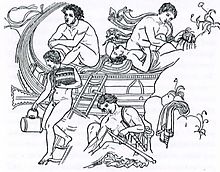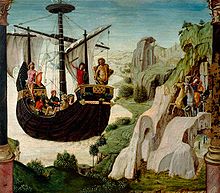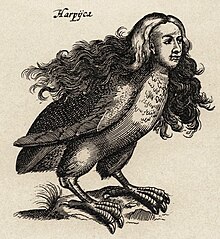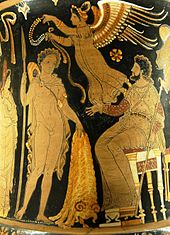Argonauts legend
The saga of the Argonauts is a complex of topics from Greek mythology and deals with the journey of Jason and his companions to Colchis in the Caucasus , the search for the Golden Fleece and its robbery. The traveling companions are called the Argonauts after their incredibly fast ship, the Argo . Already Homer makes reference to the Argonauts Myth: The Odyssey tells Kirke the Odysseus that the Argo with Heras help them successfully through planctae - two driving in the sea overhanging "Irrfelsen" against surges a strong current - whether sailed. The use of the epithet πᾶσι μέλουσα ("well-known", "much sung about ") for the Argo shows that the myth was already widespread when the Odyssey was written. More comprehensive and closed treatments of the substance are called argonautics . The oldest self-contained representation of the material are the four books of the Argonautica by Apollonios of Rhodes from the 3rd century BC. Chr.
content
The Argonaut legend has its starting point in the power struggle for the Kingdom of Thessaly in Greece. Pelias , the king who had secured power in Thessaly from his brother Aison , receives an oracle. He should beware of a single-legged man from the Greek city of Iolkos .
The mother of the gods Hera asks Pelias' nephew Jason to help her cross a stream, which causes the latter to lose a shoe. When Jason, Aison's son, steps in front of his uncle, he immediately recognizes who he is and uses a ruse. He promises his nephew the throne if he brings the golden fleece, the very valuable fur of a ram, back home from the end of the world. Pelias thinks this is a journey of no return.
The golden fleece of the ram Chrysomallos , on whose back the twins Phrixos and Helle fled from their stepmother Ino , is in the Hain des Ares in Colchis . To get there, Jason from Argos had the Argo built with 50 oars .
Jason invites Greece's most famous heroes to participate in the company. Of these, which are named very differently and in very inconsistent numbers, the best known are: Admetos , Amphiaraos , Amphion , Ankaios , Argos (the builder of the ship), Heracles , Idas , Idmon , Kalais , Kastor , Kepheus , Laertes , Lynkeus, Meleagros , Mopsos , Nestor , Oileus , Orpheus , Peleus , Philammon , Polydeukes (Pollux), Polyphemos , Telamon , Theseus , Tiphys , Tydeus , Zetes .
Iolkos is the assembly point where everyone comes together. Soon the ship will be out of the harbor; Orpheus invigorates courage by playing the harp and singing. First you get off at Pelion and visit Cheiron , who once raised Jason, then the journey goes around the Chalkidike to Samothrace . From here the ship is shifted to the Illyrian coast and from there to the island of Lemnos , where the women murdered all men (with the exception of Queen Hypsipyle's father ) for infidelity. They give the strangers a hospitable reception, and they enjoy life with the women until Heracles, who had stayed behind with some comrades on the ship, warned the defaulters to continue their journey. They sail to the Phrygian coast to Cyzicus , where the six-armed Gegeneis and peaceful Dolionen live side by side. The latter welcome the Argonauts hospitably and explain the further way to them.
After an arduous journey, the Argonauts finally land between the Propontis and the Black Sea near the town of Kios (later Prusias), where they are warmly received by the Mysians . On departure they forget Heracles, who went looking for his friend Hylas , who was kidnapped by a nymph while fetching water , as well as Polyphemus, and they sail on alone.
Shortly afterwards the Argonauts land in the Bebrykenland ( Bithynia ) in the morning . King Amykos had ordered all foreigners to compete with him in a fist fight . He contemptuously challenges the Argonauts, whereupon Polydeukes kills him in battle.
Continuing on, the Argonauts are driven to the Thracian coast to Salmydessos , where Phineus has long been tormented by the harpies by stealing or emptying his food. Zetes and Kalais save the emaciated old man. As a thank you, Phineus tells the Argonauts how they can get through the Symplegaden at the entrance to the Black Sea - the Kyanean rocks, which crush everything that passes by, whether ship or bird. First the Argonauts are held up by forty days northwest winds until sacrifice and prayer help. On the journey through the Black Sea they come to the Mariandynians , whose king Lykos welcomes them as the conqueror of his enemy Amykos. Later they come to the land of the Chalyber , then to various peoples and to the island of Tia , the Ares island, where the stymphalic birds live, which shoot their brazen feathers as arrows. Then the Argonauts see the peaks of the Caucasus and hear Prometheus ' groans and the beat of the eagle's wings as it digs in its liver.
Now they reach their destination, the Phasis River , into which they row the ship. On the left you can see the Caucasus and the capital Kyta , on the right, as the scene of the things that are to come, the field and grove of Ares.
The next morning Jason goes with Telamon and the sons of Phrixus to King Aietes to claim the Golden Fleece. Aietes promises to deliver it up when Jason plows the Ares corridor and sows the dragon's teeth with the fire- snorting, arch-footed bulls that Hephaestus had given him. Jason manages this with the help of Medea , the king's daughter, who has fallen in love with him. So the conditions are met, but Aietes refuses the fur and thinks about killing the Argonauts overnight. Medea reveals her father's plan and helps Jason steal the fleece on the condition that he takes her as his wife.
There are very different legends about the journey home of the Argonauts . Some let them take the same route they came, others through the Phasis in the Okeanos (sea), around Asia , through the Nile and partly by land where they carry the ship, partly by water via Libya (Africa) the lake Triton get into the Mediterranean Sea . According to Apollonios (" Argonautika "), the Argonauts, according to Phineus' advice, do not want to return on the same route, but instead drive through the Pontus Euxinus into the Ister (Danube); but the Kolchians follow them and cut off their way out (see also Absyrtus ).
Then the Argonauts from the Ister arrive in the Adriatic Gulf and to an island at the mouth of the Eridanos , continue to the land of the Hylleer in Illyria , past Korkyra , Melite and Kalypsos ' island. After further wanderings, Hera has an understanding and favors the further journey. Orpheus' counter-song brings the Argonauts happily past the sirens , Thetis and the Nereids help them through Scylla and Charybdis ( Strait of Messina ), and so they happily come to the happy people of the Phaeacians , whose King Alcinous welcomes them. The latter, of the overtaking Kolchians who demanded the extradition of Medea, as recognized by the persecuted Argonauts as arbiter, now wants to award the Virgin to the Kolchians. His wife Arete, however, knows how to bring about a marriage between Jason and Medea, and the Kolchians have to renounce.
The Argonauts wander through the area on land and water for a while until they finally land on the island of Aegina and return home. According to Ovid , Aison was still alive when Jason returned and was rejuvenated by Medea. Jason's mother had cursed Pelias and killed herself; her son Promachos had murdered Pelias. Now Jason comes and presents the Golden Fleece. Pelias, however, refuses Jason the throne he had promised him in return for the golden fleece.
After dedicating the Argo to Poseidon , Jason asks Medea to help him get revenge on Pelias. She persuades his daughters that if they cut him up and cook, which they do, they could rejuvenate Pelias. Medea, however, has no intention of having her rejuvenation spell work again, so that Pelias perishes in this way. His son Akastos buries his father and drives out Medea and Jason. They flee to Corinth, into the kingdom of King Creon. They live happily there for ten years until Jason falls in love with Creon's daughter, Glauke. King Creon betrothed his daughter to Jason and casts out Medea , who then takes revenge on them.
List of participants in the Argonaut train
To take part in the procession to Colchis, Jason can win over the greatest heroes of his time, including the fathers of many Troy fighters. Participant lists contain the Pythian Odes of Pindar , the Argonautica of Apollonios of Rhodes , the Argonautica of Valerius Flaccus , the Library of Apollodorus , the Fabulae of Hyginus and the Orphic Argonautica , which however differ from each other. Up to sixty varying names are given, 28 of which match in the various lists.
- Admetus , consort of Alcestis
- Akastos
- Aithalides
- Actor , son of Hippasus
- Amphiaraos one of the seven against Thebes , general from Argos
- Amphidamas , son of Aleus , brother of Cepheus
- Amphion , son of Hyperasius
- Ankaios , son of Lycurgus
- Ankaios , son of Poseidon and Althaia, successor of Tiphys as helmsman
- Areios , son of bias
- Argos , son of Arestor (or Polybos, Danaos, Hestor, Alektor) or Argos (son of Phrixos) , the builder of the ship "Argo"
- Askalaphus , son of Ares, brother of Ialmenus
- Asclepius
- Asterion , son of Antigone, daughter of Pheres
- Atalante , the fast runner
- Augias
- Autolycus , thief and son of Hermes
- Butes , retired, enticed by the sirens, on the way home
- Daskylos , joined the Argonauts in Mysia
- Deucalion
- Echion , brother of Eurytus
- Eneius , son of Kaineus
- Erginos from Orchomenos
- Eribotes , son of Teleon, killed on the way home in Libya
- Euphemus , a son of Poseidon and Europa , an oceanid
- Euryalos
- Eurydamas , son of Iros or Ktimenos
- Eurymedon , son of Dionysus and Ariadne
- Eurytion
- Eurytus , son of Hermes and Antianeira
- Heracles , the son of Zeus and Alcmene , left behind in Mysia
- Hippalkimos , son of Pelops
- Hylas , the armor-bearer of Heracles, kidnapped by nymphs in Mysia
- Ialmenos
- Jason , the leader of the train
- Idas , the son of Aphareus
- Idmon , the seer, killed by a boar among the Mariandyn people
- Iolaos , son of Iphicles and nephew of Heracles
- Iphiklos , son of Thestius
- Iphiklos
- Iphitus , son of Eurytus
- Iphitus , son of Naubolos or Hippasus
- Kaineus, son of Koronus
- Kalais , one of the Boreas sons
- Kanthos , killed on the way home in Libya
- Castor , one of the Dioscuri
- Cepheus , brother of Amphidama
- Clytius , son of Eurytos of Öchalia, brother of Iphitus killed by Aeetes
- Koronos
- Kytisoros
- Laertes , father of Odysseus
- Laocoon , son of Porthaon
- Leitos , son of Alector
- Leodokos , son of Bias, brother of Areios and Talaos
- Lynkeus , the pilot of the Argo
- Melas
- Meleagros , son of Oineus and Althaia
- Menoitios (Menotius), the father of Patroclus
- Mopsos , the soothsayer of the Argonauts, died of a snakebite on the way home in Africa
- Nauplios , son of Poseidon
- Neleus (Nileus, a warrior who claims to be a descendant of the Nile)
- Nestor , son of Neleus from Pylos
- Oileus
- Orpheus , the singer
- Palaimon , son of Hephaestus or Aitolus
- Peleus , father of Achilles
- Peneleos
- Periclymenus
- Phalerus , son of Alkon
- Phanos , son of Dionysus,
- Philoctetes , the archer
- Phlias , son of Dionysus and Ariadne
- Phocos, son of Kaineus, brother of Priasus
- Phrontis , the youngest son of Phrixus
- Peirithoos , son of Ixion
- Poias , son of Thaumakus
- Polydeukes (Pollux), one of the Dioscuri
- Polyphemus , is left behind with the Mysians
- Priasus , son of Kaineus, brother of Phocos
- Staphylos , son of Dionysus, brother of Phanos
- Talaos
- Telamon , the father of Ajax
- Theseus , son of Ageus
- Tiphys , the helmsman, died of illness with the Mariandyn people
- Zetes , one of the Boreas sons
Remarks:
- According to Apollonios of Rhodes, Theseus and Peirithoos did not take part because they were being held in the underworld.
- According to Apollonios of Rhodes, Atalante was not allowed to participate in order to avoid jealousy problems among the otherwise all-male crew.
- Nestor is mentioned as a participant by Valerius Flaccus, but according to Quintus of Smyrna ( Posthomerica ) he was denied participation by Pelias.
- In the library , Argos, the son of Phrixus, is the builder of Argo. In the other traditions, however, he and the builder are different people.
Artistic arrangements
The saga of the Argonauts has been edited in many literary terms, both as an epic and as a tragedy ; B. Eumelos , Peisandros , Aeschylos , Sophocles and others. The Greek epics of Apollonios of Rhodes and the so-called Orpheus and the Latin heroic poem of Valerius Flaccus have been preserved . A fairly detailed history of this move is also given by Pindar in the fourth Pythian ode .
Artists also made the Argonaut procession the subject of their depictions, according to Lykios in an unspecified sculptural work. In the Anakeion, the so-called Temple of the Dioscuri in Athens , the painting came from the return of the Argonauts from Mikon . A painting of Kydias bought by Quintus Hortensius Hortalus for 144,000 sesterces also deals with the Argonaut saga . Among the still existing works of art is the depiction of the defeat of Amykos by Polydeukes on the so-called. " Ficoronischen Ciste " in the Villa Giulia in Rome should be highlighted. The myth is also dealt with several times in vase pictures. More recent representations deserve mention: the Argonaut procession by Asmus Carstens and the frieze containing scenes from it by Ludwig Michael Schwanthaler in the Munich residence .
In ancient times:
- Euripides : Medea (431 BC)
- Apollonios of Rhodes: Argonautica (in the 3rd century BC)
- Library of Apollodorus 1, 9, 16–28 (in the 1st century AD)
- Gaius Valerius Flaccus : Argonautica (in the 1st century AD)
- Ovid : Metamorphoses 6, 719–7, 397 (approx. 1–8 AD), Medea (around the birth of Christ, lost)
- Seneca : Medea (in the 1st century AD)
- Orphic Argonautics (Late Antiquity)
Later edits:
- Franz Grillparzer : The golden fleece. Dramatic poem in 3 sections (1. The Guest , 2. The Argonauts , 3. Medea ; 1819)
- Aspazija : Jaunie argonauti ( The new Argonauts , poem, 1924)
- Anna Seghers : The Argonaut Ship (1949)
- Elisabeth Langgässer : Märkische Argonautfahrt (novel, 1950)
- Roger Lancelyn Green : Tales of the Greek Heroes: Retold From the Ancient Authors (1958)
- Heiner Müller : Dilapidated Shore / Media Material / Landscape with Argonauts (play, 1982)
- Georg Katzer , Medea in Corinth , oratorio based on a libretto by Christa Wolf
- Christa Wolf : Medea: Voices (free arrangement, 1998)
- Hanns Kneifel : The Trail of Aries (1999)
Film adaptations:
- Jason and the Battle for the Golden Fleece (TV monumental film, USA 2000)
- Jason and the Argonauts (fantasy film, USA / GB 1963)
literature
- Konrad Seeliger : Argonautai, Argonautensage . In: Wilhelm Heinrich Roscher (Hrsg.): Detailed lexicon of Greek and Roman mythology . Volume 1.1, Leipzig 1886, Col. 503-537 ( digitized version ).
- Otto Jessen : Argonautai . In: Paulys Realencyclopadie der classischen Antiquity Science (RE). Volume II, 1, Stuttgart 1895, Col. 743-787.
- Rolf Blatter: Argonautai . In: Lexicon Iconographicum Mythologiae Classicae (LIMC). Volume II, Zurich / Munich 1984, pp. 591-599.
- Solveig Kristina Malatrait: Jason and the Argonauts. In: Maria Moog-Grünewald (Ed.): Mythenrezeption. The ancient mythology in literature, music and art from the beginnings to the present (= Der Neue Pauly . Supplements. Volume 5). Metzler, Stuttgart / Weimar 2008, ISBN 978-3-476-02032-1 , pp. 357-366.
- Paul Dräger: Argo pasimelousa. The Argonaut myth in Greek and Roman literature . Part 1: Theos aitios . Steiner, Stuttgart 1993 (Palingenesia 43) [fundamental], ISBN 3-515-05974-1 (also dissertation at the University of Trier 1990/1991).
Translations and retelling
- Paul Dräger : Apollonios of Rhodes: The journey of the Argonauts. Greek / German. Stuttgart 2002, ISBN 3-15-018231-X
- Paul Dräger: C. Valerius Flaccus: Argonautica / The mission of the Argonauts. Latin / German, Lang, Frankfurt am Main 2003, ISBN 978-3-631-50799-5 (= Studies in Classical Philology , Volume 140)
- The Argonauts (from "Das Beste", 1982) in the Gutenberg-DE project
- The Argonauts of Apollonius (transferred from Johann Jakob Bodmer , 1779, digitized)
- The Argonaut procession or the conquest of the golden fleece (translated into German by Benedikt Willmann, 1832, digitized in the meter of the original)
- Apollonius des Rhodiers Argonautenfahrt (translated in the meter of the original by Christian Nathanael von Osiander , 1837, digitized)
- Transfers to other languages at Wikisource
- Gustav Schwab : The Argonauts legend. Österreichischer Schulbuchverlag, Vienna 1924 ( online in Legends of Classical Antiquity, 1982 ) in the Gutenberg-DE project
- Stephan Hermlin : The Argonauts. With illustrations by Fritz Cremer . Berlin: Deutscher Kinderbuchverlag, undated [1985]
- Hans Peter Duerr : The journey of the Argonauts. Insel Verlag, Berlin 2011, ISBN 978-3-458-17469-1 .
- Dimitris Michalopoulos: Les Argonautes. Dualpha, Paris 2013, ISBN 978-2-353-74251-6 .
Secondary literature
- James J. Clauss: The Best of the Argonauts: The Redefinition of the Epic Hero in Book One of Apollonius' Argonautica . University of California Press, Berkeley 1993.
Web links
Remarks
- ↑ Homer, Odyssey 12: 59-73.
- ↑ Edzard Visser: Homer's catalog of ships. Teubner, Stuttgart 1997, p. 672.
- ↑ Pindar , Pythische Oden 4, 117-187.
- ↑ Apollonios of Rhodes, Argonautika 1, 20 ff.
- ↑ Gaius Valerius Flaccus 1, 353 ff.
- ↑ Libraries of Apollodorus 1, 111-113.
- ^ Hyginus Mythographus, Fabulae 14.
- ↑ Orphic Argonautics 119 ff.





